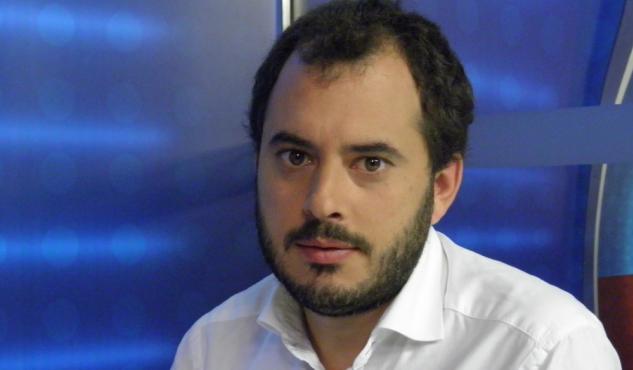The historian Marcos Maceira (Santiago de Compostela, 1978) is the president of the A Mesa Pola Normalizacion Linguistica. He combines his president post there with his job as a schoolteacher. He has been active in movements in support of the language since a young age, chairing now the direction of the main Galician cultural organization in terms of membership. At the moment of conducting this interview, he is engaged in the elaboration of a popular legislative initiative to be presented at the Parliament of Galicia in the upcoming days.
What are the functions pursued by the organization A Mesa Pola Normalizacion Linguística you lead?
A Mesa started out in 1986 as a way of facing up as a people to the appeal filed by the Spanish government against the language normalization act. Today our organization numbers approximately 4,000 members, with its main purpose being the defence and encouragement of the Galician language. We also do our best to make up for the deficiencies and holes related to the linguistic domain identified in the Galician administration; it is worth remembering that our resources are limited, and do not receive public allowances whatsoever. We are intent on spreading linguistic awareness, at the same time denouncing attacks on linguistic rights. We provide a shield to the citizens in defence of those rights.
We are at the moment drawing up a popular legislative initiative to present it before the Parliament of Galicia. We have elaborated this legal initiative with a view to protecting the linguistic rights of the citizens in the social-economic domain, supported by 27,000 signatures so far. We plan to present it next week, and have earned the approval of all political parties except for the PP, Spanish Conservatives. Our goal is to avoid linguistic discrimination directed against anyone in commerce (the socio-economic field.)
It comes as a surprise for us the Basques to see that PP’s representatives in your nation use Galician almost exclusively. For instance, we always hear Galician president Alberto Nuñez Feijoo speaking to the media in your language; that would be unthinkable when it comes to Basque PP members. It is striking to see that despite showing that linguistic allegiance in public PP officials should by contrast position so far from policies in support of the normalization of Galician…
It holds true that PP MPs, as other MPs do, speak in Galician always in the parliamentary chamber, but that attitude vanishes outside of that context. The president Nuñez Feixoo, for instance, speaks Spanish carelessly when he reunites with entrepreneurs, or in events outside of the parliament, so your outsider perception is actually somewhat deceptive…
Now, that said, without indulging in pride, thanks to the work and pressure exerted by our and other organizations, we have managed to get the Galician political class voice always their support for the language, at least officially. However, as you pointed out, they do not hesitate to pursue policies against our language.
Bilingualism in society turns out trickier in many stateless nations when the languages in contact differ widely from each other in terms of linguistic structure, e.g. Basque Country, Wales, Brittany… Therefore, the linguistic affinity between Spanish and Galician, their mutual intelligibility, should add to bilingualism in society. However, actually, does that linguist affinity facilitate the social use of Galician, or does it hamper it?
Linguistic affinity between the two languages spoken in Galicia should play in favour of the exclusive use of our language in administration, since no one can claim ignorance on it, let alone written language. However, you would need political will for that, and there is not any in Galicia.
In addition, that closeness to Spanish induces an “hybridization” of Galician, which undermines our language; our language is ever more influenced by Spanish. The Galician spoken by many politicians may well suffice to understand the attrition our language goes through, i.e. what could have been an incentive to develop the exclusive use of Galician turns out to be a hindrance for our language that results in hybridization and attrition. And that happens to our People because a policy is ongoing to wipe off our language, despite the resistance put up by some sectors.
According to figures, Galicia shows the strongest position in native language competence throughout the Peninsula, ahead of nations like Catalonia and Basque Country. By contrast, national awareness is feebler here that in these two nations. To what extent do you establish a link between language and national awareness? Are they closely related? What is your take on the Galician political sociology in relation to its linguistic situation?
There is no doubt a strong link between language and People. However, sometimes external factors distort that relation. In Galicia, for example, the people speaking mostly in Galician, especially aging people from rural areas, often show the lowest rates of national and linguistic awareness. The education received has a strong bearing on that. That low self-esteem towards the language does not originate only from Francoism, but further back in time: Many generations during history were raised in an anti-Galician environment, stripping our language of its prestige, for the benefit of Spanish.
Fortunately, there exists another Galician-speaking sector showing a big linguistic awareness; they have a stronger national awareness. Therefore, I believe that as long as our People and sense of national identity keep growing, the social use of our language will also increase.

Research has revealed that in your country the elderly show the highest rates of language use, while the children and the youth rank last. Is family transmission failing? What do these data reveal?
Many Galician speakers drag a full load of hang-ups, especially the elderly, due to the linguistic racism implemented by the State during centuries. Those detrimental hang-ups and mean prejudices have deeply affected family transmission, bringing it almost to a halt. Fortunately, it seems that last years that decline has been somewhat mitigated.
Additionally, the education received by our children and youth at school exerts a big deal of influence on their linguistic practices: Nowadays we do not have a Galician immersion education model, and Spain remains the chief language in most of schools. From 2005 to 2009, on arrival of PSOE and BNG to office, some attempts were made to improve Galician’s status in the education system, but PP’s comeback to government reverted the situation.
Actually, those territories ruled by PP, such as Galicia, the Valencian Community, the Balearic Islands, Navarre with its proxy UPN, have seen an attempt to undermine native languages in school, by imposing an English bilingual system. It is hardly surprising their lack of a like anglophile zeal in Castile and Rioja, for example. Do you think that attitude could hide a state’s strategy to undermine our national languages? Related to that, what is the status of your language in the schooling system?
No doubt, that hides a mean-intentioned state strategy, available for anyone in the FAES foundation’s reports. Furthermore, Galicia turned into an experimental domain for the implementation of that multilingual model encouraging English…
Here, the use of English aims at shifting the native language from schools, and undermining Galician. Unfortunately, Galician does not stand at a par with Catalonia or the Basque Autonomous Community in terms of governmental support, so competition with Spanish and English devalues writ large our language.
Nowadays, subjects taught in Galician at schools only amount to a 33% of the curriculum. There is no obligation to use it further, so it falls really short of a linguistic normalization. A study we carried out revealed that in main Galician towns and cities, only 3% of the schools provided more than a 50% of the tuition in Galician, be it public or private network. The LOMCE act has conspicuously worsened the native language’s status in the education system.
Both Galician and Basque have been subject to increased prestige loss over the centuries; the urban elites and enlightened bourgeoisie have nearly always turned a cold shoulder, labelling them as “farmstead dialects”, or “old and archaic tongues”. Besides undergoing the physical and direct repression to impose Spanish on us, we have tasted that other meaner and faster, “French style” repression, aiming at self-loath and social prestige loss…
No better way to put it. It has often be noted that Francoism is to blame for that situation, but Francoism is only the outcome of a long Spanish tradition. In Spain, linguistic racism sinks deep its roots.
It is sad to see that by 2017 that linguistic racism is still well alive. The initiative we have launched to eradicate linguistic apartheid from retail shows the appalling linguistic situation we are going through… It discloses the actual situation of Galician. The worse a people’s situation, the worse its language’s status.
Spanish nationalism has come up with a perverse rhetoric emphasizing that Basque, or Galician for the matter, needs to be depoliticized. Those who have imposed a strict pro-Spanish language policy for centuries now want to strip us of our linguistic activism, to prevent it from “damaging” the language. In their view, when we voice publicly our denouncement of breach of linguistic rights, we “politicize” the language. If no one is able to provide service in my language at a RENFE train station, or if they frown on me because I speak Basque, the only alternative given to me seems to be linguistic meekness, either give in, or politicize language. Do you think that perverse discourse demobilizes people?
They try hard at least. That rhetoric aims at ignoring linguistic conflict by deactivating activism, but actually it is they who politicize language: The Spanish constitution, in its 3rd article, sets out that all of us living in this state must be able to speak Spanish. By contrast, if we demand the same for our languages, we are politicizing the topic… That is astonishing.
We just want to live as a normal People; I should be able to live normally in my Country, in the same way as a French living in Paris does.
Nowadays, we all know and accept that the civilized, only way to work out social issues is politics, and language is a social issue. It is a public matter; it represents the main collective product of a People. Therefore, we do not politicize language, we use politics to defend the language. Those who tell us that we politicize the language stand for the sector who does not want to see Galician, Catalan, or Basque normalized.
In this ever globalizing world, do languages like ours, stateless languages, have any future prospects? Is there any glimmer of hope?
There is no doubt that our current globalization, in the way it develops, brings about the destruction of cultural diversity, but having one’s own state does limit the damage insomuch as it shields the language and culture. We, the stateless Peoples, stand up face-to-face to the threat of globalization.
At any rate, we will live in a more democratic, plural and socially fair world if there is respect to language diversity and if we all understand that relations between all languages need to rely on the equality of conditions.
INTERVIEW CONDUCTED BY NAZIOGINTZA
September 2017

